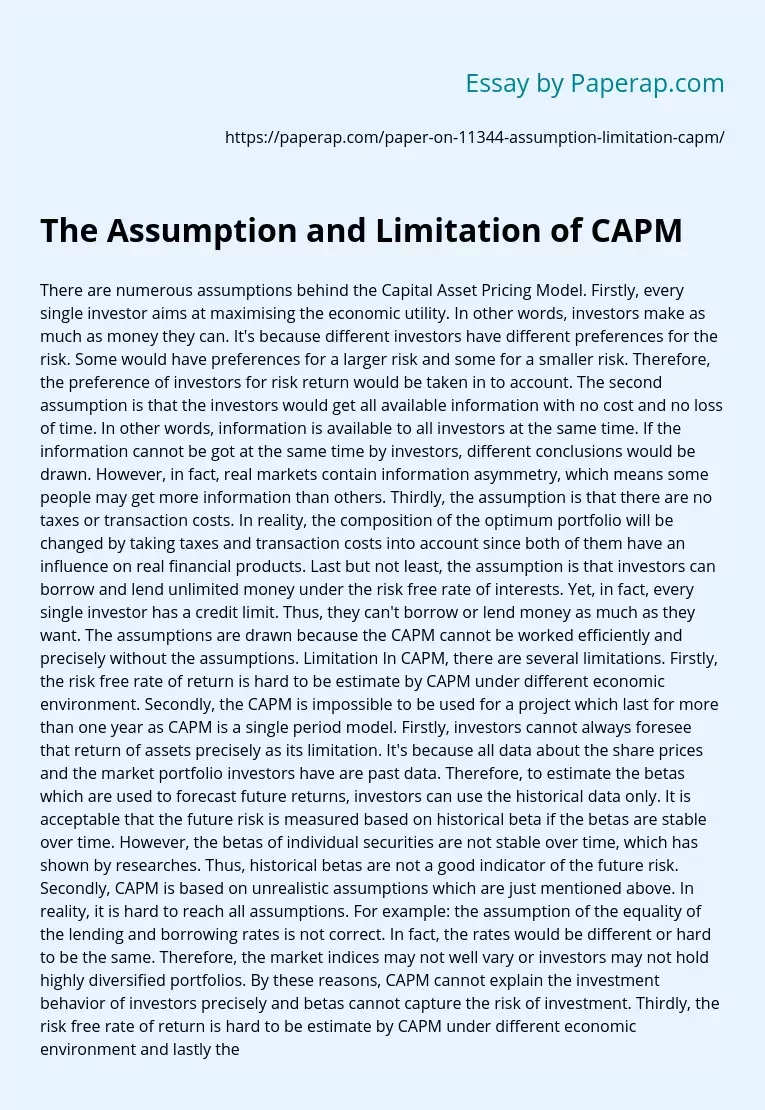The Assumption and Limitation of CAPM
There are numerous assumptions behind the Capital Asset Pricing Model. Firstly, every single investor aims at maximising the economic utility. In other words, investors make as much as money they can. It’s because different investors have different preferences for the risk. Some would have preferences for a larger risk and some for a smaller risk. Therefore, the preference of investors for risk return would be taken in to account. The second assumption is that the investors would get all available information with no cost and no loss of time.
In other words, information is available to all investors at the same time.
If the information cannot be got at the same time by investors, different conclusions would be drawn. However, in fact, real markets contain information asymmetry, which means some people may get more information than others. Thirdly, the assumption is that there are no taxes or transaction costs. In reality, the composition of the optimum portfolio will be changed by taking taxes and transaction costs into account since both of them have an influence on real financial products.
Last but not least, the assumption is that investors can borrow and lend unlimited money under the risk free rate of interests.
Yet, in fact, every single investor has a credit limit. Thus, they can’t borrow or lend money as much as they want. The assumptions are drawn because the CAPM cannot be worked efficiently and precisely without the assumptions. Limitation In CAPM, there are several limitations. Firstly, the risk free rate of return is hard to be estimate by CAPM under different economic environment.
Secondly, the CAPM is impossible to be used for a project which last for more than one year as CAPM is a single period model. Firstly, investors cannot always foresee that return of assets precisely as its limitation.
It’s because all data about the share prices and the market portfolio investors have are past data. Therefore, to estimate the betas which are used to forecast future returns, investors can use the historical data only. It is acceptable that the future risk is measured based on historical beta if the betas are stable over time. However, the betas of individual securities are not stable over time, which has shown by researches. Thus, historical betas are not a good indicator of the future risk. Secondly, CAPM is based on unrealistic assumptions which are just mentioned above. In reality, it is hard to reach all assumptions.
For example: the assumption of the equality of the lending and borrowing rates is not correct. In fact, the rates would be different or hard to be the same. Therefore, the market indices may not well vary or investors may not hold highly diversified portfolios. By these reasons, CAPM cannot explain the investment behavior of investors precisely and betas cannot capture the risk of investment. Thirdly, the risk free rate of return is hard to be estimate by CAPM under different economic environment and lastly the CAPM is impossible to be used for a project which last for more than one year as CAPM is a single period model. The Use of CAPM
CAPM is used to look for explaining the relationship between risk and return in a rational equilibrium market. By doing that, there are many uses of CAPM. Firstly, investors can determine if the portfolio should be undertaken or not by analysing the CAPM. Secondly, it can give the idea for investors what decision they should make if the security’s risk versus expected return is plotted below or above the SML in the graph. For example: if a stock is plotted well below the SML, the investor should not buy it because the investor can get the higher expected return by investing half their money in Treasury bills and half in the market portfolio.
Thirdly, in dividend valuation models, an asset is valued with the provision of an appropriate discount rate. Such valuation is obtained with the help from CAPM which indicates the expected or required rates of return on risky assets. Comparisons can be made between the two rates implied by CAPM with a result of over or under valuation. Thus, investors can determine the decision conveniently. Conclusion To conclude, Capital Asset Pricing Model is an easy and sensible theory which can explain the behavior of security profitability.
It is very popular nowadays because this model is built on modern portfolio theory and it can distinguish between systematic risk and non-systematic risk easily. Therefore, people can understand and make the financial decision easily. However, CAPM is quite controversial in some circumstances because it is hard to recognize the market portfolio and the return and besides, betas are not easy to be estimated. Without the details of the return and betas, the decision of investors cannot be drawn easily or precisely. Therefore, sufficient information is needed in CAPM.
The Assumption and Limitation of CAPM. (2017, Dec 25). Retrieved from https://paperap.com/paper-on-11344-assumption-limitation-capm/

